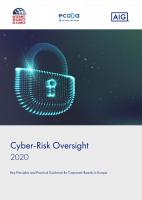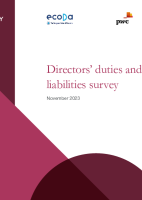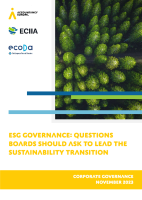EU Audit legislation, adopted in 2014 introduces more detailed requirements regarding the statutory audit of ‘Public Interest Entities’ (PIEs). The aim of the legislation is to reinforce the quality of the audit and independence of the statutory auditor or audit firm and to restore investor confidence in financial information. This will be achieved in part by fostering more open competition within the audit market and by ensuring that audit committees take their responsibilities in the selection of an audit firm very seriously.
Given that the functions assigned to the audit committee have been extended in various ways, the European Confederation of Directors’ Associations (ecoDa) in cooperation with PwC has decided to help audit committee members understand the main changes by providing a description of aspects of the new legislation affecting audit committees, in comparison with the 2006 Directive. Many companies have yet to assess the full implications of this reform and are still in the process of getting ready to adapt to these changes although the legislation will be applicable from 17 June 2016.
The new EU regulatory framework contains a number of Member State options; for each of these aspects, flexibility is left to the Member States to opt for lighter or stricter rules. Flexibility in governance matters is a good policy, however, it remains important that the final national implementing laws result in a coherent framework that enhances audit quality and leaves audit committees in a situation where they can properly perform their new duties.
Audit committees have an important role to play in robust corporate governance. Their role in appointing the auditor, and overseeing management and the auditor, underpins the integrity of financial reporting. Putting audit committees at the heart of audit quality acknowledges their value and conveys the important work that audit committees perform. ecoDa recommends independence of the audit committee’s members and not only of the chairman. Audit Committees should be able to confront the board when a problem occurs. In fact, in most jurisdictions, it is common practice to appoint a separate person to be the chair of audit committee, distinct from the board’s chair, to ensure this level of independence.
This being said, Audit Committees should not be seen as separate bodies from the boards. Audit Committees’ members are appointed by the board whereas the board is appointed by the shareholders. Therefore, ecoDa believes that the critical evaluation of the composition and performance of the audit committee should remain the sole responsibility of the board, and calls on competent authorities in the EU to assess the performance of audit committees within the limits of monitoring audit market quality and competition, and not beyond.
Celoten dokument je na voljo samo članom ZNS.
Največkrat prenešene vsebine
Cyber-Risk Oversight
Key Principles and Practical Guidance for Corporate Boards in Europe
WHY A CYBER ...
Poglej dokumentA practical guide for boards leadership teams on sustainability
To support businesses, ecoDa and Mazars have joined forces ...
Poglej dokumentDirectors’ duties and liabilities survey
The EU already has diverse rules on directors' liability ac ...
Poglej dokument











